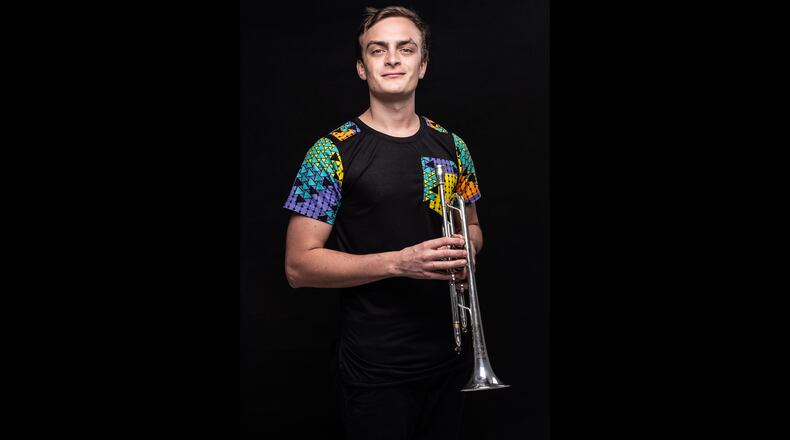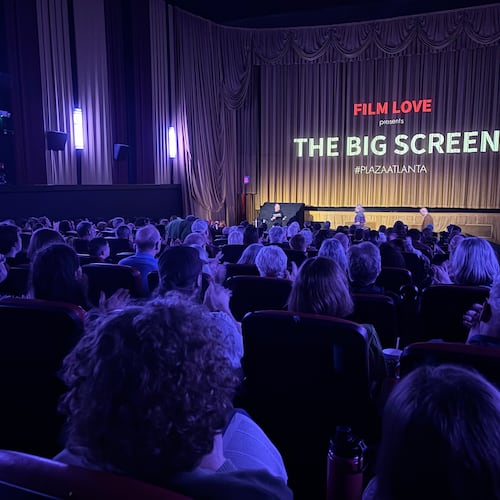The songs of Johnny Mercer are as familiar as air.
“Moon River.” “Hooray for Hollywood.” “Summer Wind.” “Autumn Leaves.” “Come Rain or Come Shine.”
The Savannah-born lyricist and singer’s legacy doesn’t need any amplifying, but when his timeless work is presented on Friday by the Georgia State University Jazz Band with guest trumpeter Joe Gransden and vocalist Tierney Sutton, there will be a few surprises in the setlist.
Marco Maritz, a South African trumpet player who has worked as a graduate research assistant in the GSU Library Special Collections and Archives, crafted new arrangements for four of Mercer’s unpublished works.
“I Think We Need a Little Drink,” “Fate Moves in Mysterious Ways,” “Be Happy” and “You Knock Me Out” will be performed by the group, including Maritz.
A bright, humble young man who is working toward a graduate degree in jazz studies, Maritz came to GSU in 2018. Several years earlier, Dr. Gordon Vernick, professor of music and coordinator of jazz studies at the university, visited Maritz’s native Cape Town, South Africa, where the trumpeter was working on his undergraduate degree in jazz education at the University of Cape Town. Vernick was scouting students for scholarships, and in 2017 offered one to Maritz through the Johnny Mercer Foundation.
“I’m so grateful for him as my mentor and teacher,” Maritz, 24, said of Vernick. “Luckily for me, the Foundation has given me so many good opportunities. I’m so grateful for them because a lot of students like me — especially being foreign — it’s quite tough to get a really good education and also a scholarship.”
In a recent conversation, Maritz explained his interest in Mercer’s work and his process in writing the new arrangements. He also repeatedly expressed his gratitude for the opportunity to embark on this “learning curve” and said he hopes to return to his native country to share his knowledge.
“My goal in life was to see how I could leave a footprint behind for other people, and the Mercer Foundation uplifted me to do that,” Maritz said. “I can say I’m not the same man from three years ago to now.”
Q: You’ve said that you weren’t that aware of Johnny Mercer until Kevin Fleming (GSU’s popular music and culture archivist) introduced you to him. You went from zero to 1,000 quite fast.
A: I knew "Moon River" was written by (Mercer), but I didn't really know him because I wasn't really studying any vocalists at the time. Initially, I dove into the unpublished works. We knew he had written more than 1,400 songs and more than 300 are unpublished. I decided to dig into his history, study him and who he worked with. His main focus was on lyrics and rhyming. He was an expert in that field, but when it came to writing melodies, he had someone write the piano parts because he couldn't read or write music. I had sketches of lyrics, which were his…For the first two months, I went in every day, opened all the boxes and made a decision on what tunes I would like to present for this concert. By the fourth month, I had about 15 tunes I thought had potential.
Q: What was your process at that point?
A: The first step of arranging is getting a lead sheet to combine the lyrics to the melody and then the melody to the chords. Once that is completed, then you arrange for a small ensemble and then a big ensemble, like a big band. I had never had an arranging class for big band, which is what I had to do for this concert. I got some books about how to arrange for big bands, and Kevin Fleming introduced me to the "Big Band Jump" radio series (from the '80s with host Don Kennedy, who worked for decades in Atlanta broadcasting). I decided to listen to big band music from the 1940s through the 1960s. I wanted to be authentic and pay as close attention to what it should have sounded like in that time period. I had to do a lot of listening — Count Basie, Duke Ellington — just to kind of figure out how they've written these charts.
Q: Have you played with Joe Gransden before?
A: Yes, I studied with Joe; he was my teacher for a year. When I heard him the first time, I was just fell in love with his style. I've played in his big band at Café 290, and I would say by far, this is the best big band I've ever played for and heard live. All of the professional musicians I look up to. I always walk away learning something.
CONCERT PREVIEW
Johnny Mercer Tribute featuring Joe Gransden, Tierney Sutton and the Georgia State University Jazz Band
8 p.m. Friday. $20-$52. Rialto Center for the Arts at Georgia State University, 80 Forsyth St. NW, Atlanta. 404-413-9849, rialto.gsu.edu/
About the Author
Keep Reading
The Latest
Featured






